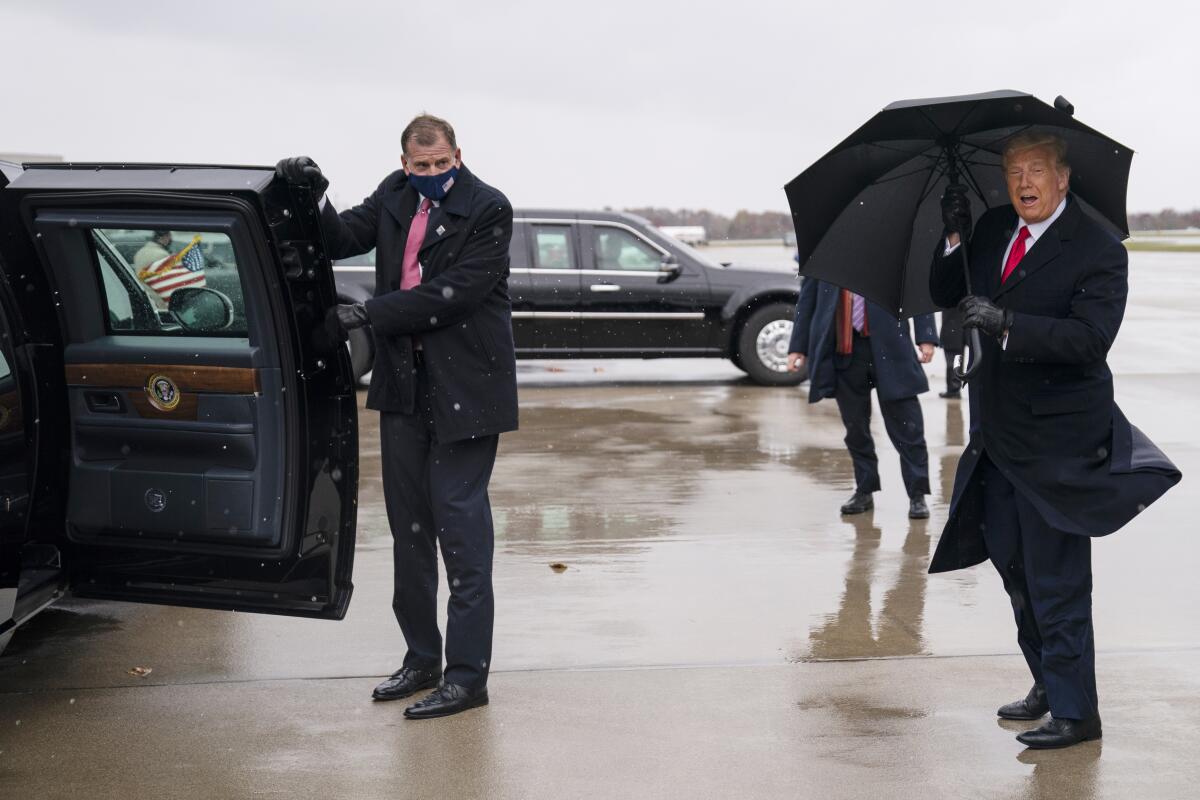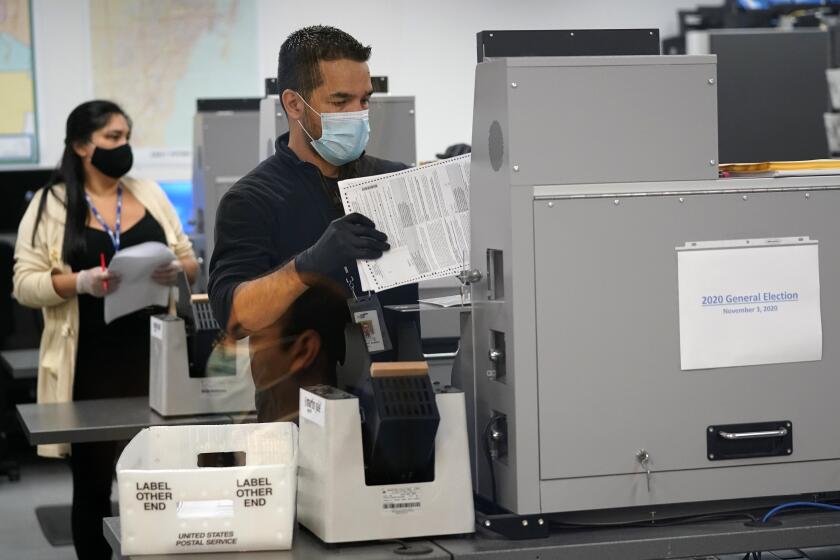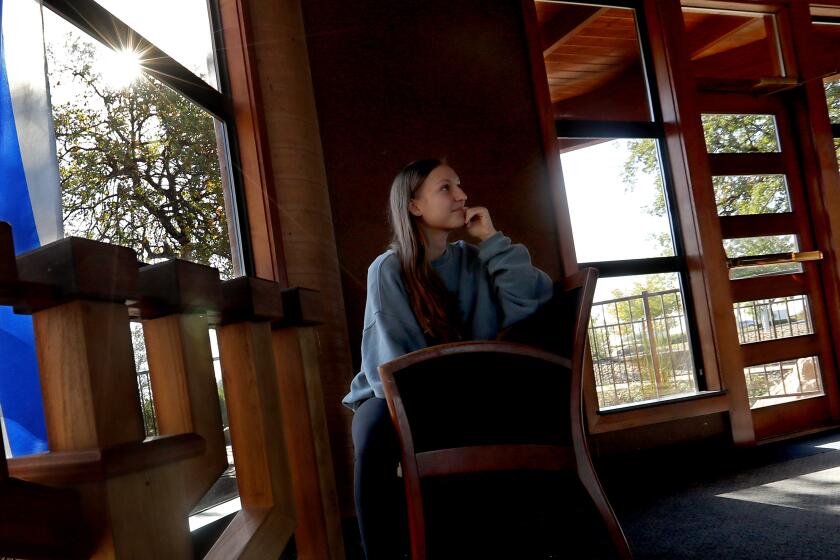As his reelection path narrows, Trump seeks to undermine vote

- Share via
WASHINGTON — With time running out and his prospects dwindling, President Trump stepped up efforts Sunday to undermine an election he stands in grave peril of losing.
Speaking to supporters in Dubuque, Iowa — part of a five-state tour of campaign battlegrounds — Trump again raised his baseless assertion that the race should be called on election night, which would mean not counting tens of millions of legitimate votes.
“We should know the result of the election on Nov. 3. The evening of Nov. 3,” he said. “That’s the way it’s been, and that’s the way it should be. What’s going on in this country? What’s going on?”
What has gone on is an unprecedented rush to vote early, as Americans seek to avoid crowds on election day amid a deadly pandemic and ensure their ballots arrive in time after the U.S. Postal Service took steps that raised doubts about its ability to do so. The head of the Postal Service, Louis DeJoy, has been a major donor to Trump and the Republican Party.
Even without a pandemic, U.S. elections have often not been resolved on election day.
Election 2020: These states will probably decide if Joe Biden or President Trump wins the race. And their absentee ballot laws could determine when we find out.
As of Sunday, more than 93 million Americans had cast early ballots, with Democrats holding a significant edge. Republicans hope to make up the difference, and then some, with a strong showing Tuesday.
That is where Trump appears to see his best hope.
In two potentially decisive states — Pennsylvania and Wisconsin — officials can’t begin processing early ballots until election day. Because of that, Trump could be ahead in the initial count Tuesday night in those states, even if more votes have been cast for Democratic nominee Joe Biden.
Trump and his associates suggested that the practice of counting every vote was an underhanded plot.
“If you speak with many smart Democrats, they believe that President Trump will be ahead on election night ... and then they’re going to try to steal it back after the election,” Jason Miller, a Trump campaign aide, said on ABC.
The president signaled his intention to rush to court as soon as the polls close. “We’re going in with our lawyers,” he told reporters ahead of an evening rally in North Carolina.
In fact, it is standard practice in many states, and perfectly legal, for ballots that are cast early or postmarked on election day to be counted after polls close.
Trump, however, sees it differently, complaining at a rally in Rome, Ga., about voters mailing in their ballots so close to election day. “Let them put their ballots in early,” he said. “They don’t have to wait until the end.”
Campaigning in Philadelphia, a scornful Biden accused Trump of purposely trying to suppress turnout and undermining the country’s fundamental values.
“I don’t care how hard Donald Trump tries, there’s nothing to stop this nation from voting,” Biden said at a faith-based get-out-the-vote rally. “The only thing that can tear us apart is America itself, and that’s what Trump is trying to do.”
In remarks that combined inspirational rhetoric with a scathing dismissal of Trump’s record on a range of issues — the COVID-19 pandemic, racial injustice, the slumping economy — Biden described Pennsylvania and its 20 electoral votes as vital to the election.
“If you have your say, he doesn’t stand a chance,” the Scranton, Pa., native told socially distanced supporters in the parking lot of a landmark Baptist church. They replied with a raucous chorus of car honks.
Later, at a drive-in rally at Philadelphia’s Franklin Delano Roosevelt Park, Biden tore into Trump for avoiding taxes, denigrating military service and undermining long-standing institutions. Pointing to the city’s historical role in the birthing of America, the former vice president said he never believed democracy “would be this much in jeopardy.”
“He’s the virus!” Biden said of Trump.
“It’s time to stand up,” he said in a passionate summation. “Take back our democracy.”
The clash over balloting came as Trump and Biden began a final blitz of battleground states Sunday, trading accusations and scouring for the rare voter who might still be swayed, with 48 hours left in the caustic campaign.
A new batch of polls suggested that for all the year’s volatility — pandemic, protests, economic hardship — the presidential contest remains remarkably stable, with Biden continuing to hold a significant advantage in nationwide surveys and a smaller but durable edge over Trump in most battleground states.
Trailing in fundraising as well as opinion surveys, the president had the more aggressive itinerary, hopscotching from Michigan, Iowa, North Carolina and Georgia to Florida.
Trump’s speeches — a melange of boasts, sarcastic riffs and ad-libbed asides — were lightly tailored for each state.
In Michigan, he began with a misleading pitch geared to the state’s vital auto industry, blaming job losses on the Obama administration, even though statewide unemployment fell during Obama’s presidency, and car factories continued to close after Trump was elected.
“You didn’t have any auto plants four years ago,” he said. (In fact, the first auto manufacturing plant opened in Detroit in 1899.)
Speaking outside Detroit, amid rain and temperatures in the 30s, Trump spoke only passingly about the worsening pandemic, promising that a vaccine was “coming in a matter of weeks” and slamming Democratic governors for shutting down businesses to fight the spread of the coronavirus. At one point, he suggested that social distancing and other public health measures had been promoted in vain.
“The whole world has gone through a lot. And for what?” he said.
Supporters shivering in the cold laughed as he mocked Biden’s small, socially distanced crowds — intended as safety measures against the coronavirus — and called the former vice president “a dummy and a half.”
The crowd took up a familiar cry from 2016, repurposed for the current campaign. “Lock him up!” they chanted.
The Bethel School of Supernatural Ministry caused a super-spreader event in Redding.
The FBI, meanwhile, announced that it was investigating an incident Friday in which a caravan of Trump supporters on a Texas freeway swarmed a Biden bus, prompting the cancellation of several campaign stops.
Trump, who approvingly shared a video of the incident, tweeted, “In my opinion, these patriots did nothing wrong. Instead, the FBI & Justice should be investigating the terrorists, anarchists, and agitators of ANTIFA, who run around burning down our Democrat run cities and hurting our people!”
For his part, Biden made a series of stops across Pennsylvania, which has emerged as a pivot point in the race. Polls of the state give the former vice president a steady but not overwhelming lead.
Trump’s narrow Pennsylvania win four years ago, combined with upsets in Michigan and Wisconsin, put him in the White House despite losing the popular vote to Hillary Clinton.
Even before Biden’s scheduled rally in Philadelphia, campaign animosity followed him to Sunday worship. In his hometown of Wilmington, Del., a group of protesters heckled Biden as he entered the Brandywine Roman Catholic Church, a sign of the antagonism of this election season.
While Biden worked to nail down Pennsylvania, his running mate, California Sen. Kamala Harris, reached deep into Republican territory, stumping in Atlanta before heading to North Carolina. Vice President Mike Pence also campaigned in North Carolina, one of the closest-fought states in the past several presidential campaigns.
Speaking briefly with reporters, Harris — the daughter of immigrants from Jamaica and India — was asked whether Democrats were doing enough to appeal to Black voters, a bedrock of the party.
“First of all, we’re not telling anybody they’re supposed to vote for us,” Harris said. “We have to earn the vote of every person.”
Later, addressing a crowd of several hundred lining the parking lot of a Gwinnett County arena, she summoned the memory of the late civil rights hero and Georgia Rep. John Lewis.
“You know the thing about John … he was an extraordinary human being,” Harris said. “He knew the fight for voting rights is an extension of the fight for civil rights.”
“We will not be deterred,” she added. “We will not be sidelined. We will not be silenced.”
Stokols and King reported from Washington and Barabak from San Francisco. Staff writer Chris Megerian in Washington contributed to this report.
More to Read
Get the L.A. Times Politics newsletter
Deeply reported insights into legislation, politics and policy from Sacramento, Washington and beyond. In your inbox three times per week.
You may occasionally receive promotional content from the Los Angeles Times.














